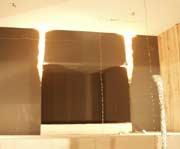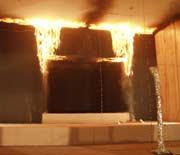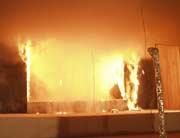- Remarks by James Hill, Acting Director, Building and Fire Research Laboratory
- Remarks by William Grosshandler, Lead Investigator, Rhode Island Nighclub fire (PDF-requires Adobe Reader)
- Video (for text description see Grosshandler remarks) (requires RealPlayer)



The Commerce Department's National Institute of Standards and Technology (NIST) today reported solid progress in the agency's ongoing federal technical investigation of the Feb. 20, 2003, fire at The Station nightclub in W. Warwick, R.I. At a press briefing in Providence, R.I., the investigation team leaders also asked the people of Rhode Island to volunteer information to help the effort continue toward a successful outcome.
"As our investigation moves into its next stages, NIST needs individuals and groups to share with us any information that they have about The Station nightclub, its operations and emergency procedures, and the events in the building on the night of the fire," said James E. Hill, acting director of NIST's Building and Fire Research Laboratory. "Providing us key information could greatly enhance our investigation. When we complete this effort, we want to be able to provide the kind of recommendations that could prevent this kind of tragedy from being repeated in other communities around the United States in the years to come."
The investigation is being conducted under the authority of the National Construction Safety Team (NCST) Act. Under the act, NIST is authorized to investigate building failures. The NIST investigations will establish the likely technical causes of the building failure and evaluate the technical aspects of emergency response and evacuation procedures in the wake of such failures. The goal is to recommend improvements to the way in which buildings are designed, constructed, maintained and used in order to increase both occupant safety and structural integrity.
NIST announced at the press briefing that it has established a toll-free, anonymous phone line for persons with information to contact the Rhode Island investigation team at (877) 451-8001. Individuals also can provide information by fax at (301) 975-6122; by e-mail at ncst [at] nist.gov (ncst[at]nist[dot]gov); or by regular mail at NCST Rhode Island Investigation, NIST, 100 Bureau Dr., Stop 8660, Gaithersburg, Md. 20899-8660.
The Rhode Island investigation team's primary objectives are to:
- determine the conditions in The Station nightclub prior to the fire, such as the materials of construction and contents; the location and conditions of doors, windows and ventilation; the installed fire protection systems; the number of occupants and their approximate locations;
- reconstruct the fire ignition, fire spread and survivability within the building using computer models;
- examine the impact on survivability of having an installed sprinkler system, all other conditions being the same; and
- analyze the emergency evacuation and occupant responses to better understand the impediments to safe egress.
At today's press briefing, NIST's lead investigator of The Station nightclub fire, William Grosshandler, said that the investigation team had made significant progress toward achieving these objectives.
Among the accomplishments to date, Grosshandler said, are:
- the establishment of a partially complete floor plan of The Station nightclub including the location of vents, doors and windows, and details about ceiling height;
- the conducting of laboratory fire tests on three common types of foam wall covering to provide data for computer fire simulations;
- the development of a preliminary computer simulation of the fire and smoke behavior within The Station nightclub stage area;
- the conducting of fire tests on reconstructions of The Station nightclub stage area, both with and without sprinklers; and
- the use of evacuation behavior predicting software programs to derive an estimate of the length of time needed to completely evacuate the occupants of The Station nightclub on Feb. 20, 2003.
Grosshandler stressed that more information was still needed for the investigation to most successfully complete its objectives. He asked that anyone willing to share this information with the investigation team come forward. (See How to Provide Information on The Station Nightclub Fire to NIST)
Possible sources for information about The Station nightclub and the events of Feb. 20, 2003, Grosshandler said, include survivors, employees, families of victims, emergency responders, the media, former employees, previous patrons, contractors, suppliers, retired first responders and friends of victims.
Among the key data still required by the NIST investigation team are:
- details of the geometry (interior and exterior) of The Station nightclub, prior to and on Feb. 20, 2003;
- details of materials and finishes on the ceiling, walls and floors of the nightclub;
- descriptions and locations of furnishings;
- the positions of windows and doors prior to and during the evacuation;
- first-hand observations of fire and smoke spread, and operation of the nightclub's fire alarm;
- the number and location of employees and patrons present at the start of the fire;
- accounts of difficulties encountered during the evacuation;
- casualty reports; and
- the number and type of emergency response units, and the approximate timeline of emergency response activities.
Grosshandler said that the NIST investigation team will accept this information in any format, including photographs, videos, recordings, plans, documents, material samples and personal recollections.
For more information on the Rhode Island fire investigation and the NCST, go to http://www.nist.gov/ncst. For a comprehensive Web site on NIST's other ongoing NCST investigation—the study of the fires in and collapse of three buildings at New York City's World Trade Center complex following the terrorist attacks on Sept. 11, 2003—go to http://wtc.nist.gov.
As a non-regulatory agency of the U.S. Department of Commerce's Technology Administration, NIST develops and promotes measurement, standards and technology to enhance productivity, facilitate trade and improve the quality of life.

